By THE INFAMOUS REVIEWER Gio 🦀
Q1: what was the initial motivation to write Island of The Lost? And what or who influenced the final product?
ML: Before I had started writing Island of the Lost my ambition was to write an urban fantasy novel. At the time I was reading the Monster Hunter series by Larry Correia (paid link) and wanted to try my hand at the genre. As I was fleshing out the story and the world I soon realized I didn’t have the skills to tackle a story of that length and scope. In the end I shelved the idea, kept the notes for the world I had built, and set about writing a smaller more contained adventure. Island of the Lost was the result.
Hannibal Harken started out as a character who had built a legend around himself seeking out the weird and magical, cataloging what he found, and creating a vast encyclopedia to pass on that information to others. In the original idea he was a bit of a character who would be referenced but never appear. His journal entries would have appeared in the appendix of the book and would have served as a means of providing world building and lore without dumping all that information in the middle of the narrative. This idea is why Island of the Lost starts out the way it does.
In the end I would have to say there are two main sources of influence on this novel. I’ve always loved the 1920’s – 1940’s style action hero and Harken was meant to fit into that mold. I wanted the main character to be in a similar vein to Indiana Jones and Rick O’Connell. But it wasn’t until I was introduced to Doc Savage via Razorfist’s video on pulp characters that Harken really coalesced as a character. The Man of Bronze really is the first Superhero and the gold standard for this type of fiction. To understand what makes Doc such a pulp icon helps a writer understand the genre.
My second influence would be the Death Gate Cycle by Margaret Weiss and Tracy Hickman. I loved the worlds they created in that series and it has served as inspiration for the world Harken and his friends inhabit.
Q2: are The Island of the Lost and your other (cyberpunk) novel your very first official publications?
ML: The Island of the Lost and The City Beneath the Eye (paid links) are my very first official publications. I have written quite a bit in the past. From short stories as a kid to a book trilogy when I was in early college. Telling stories has been a passion of mine for a while, though it was only for friends. Until recently I saw writing as a fun hobby but not something I would do as a profession. It wasn’t until Razorfist put out that Iron Age video that I decided to throw my hat in the ring and start creating for others’ enjoyment.
Q3: this book went through a ‘revision’ as stated under the book description on Amazon. Can you share with VP what exactly was revised and why?
ML: Oh yeah, the book went through a major revision! When I first started writing and connecting with other people on X/Twitter I became aware of what Brian Niemeier calls ‘Self-Publish Syndrome’. Self Pub opens the door for everyone to put together a novel and publish it through Amazon no matter the quality. Because of this, self published works carry a stigma of being poorly edited, poorly written garbage. I was determined to avoid that stigma, then fell face first into it.
As I finished the first edit on the manuscript, I knew I needed an editor to polish this story as much as possible. At the time I had let one of my coworkers know I was working on a novel and was looking for an editor. He had a contact that had spent over twenty years as a technical writer and this person had spoken about moving into editing as a side hustle. He put us in contact and we worked out a nominal fee for an editing pass of my manuscript. It was more affordable than some of the editing rates I was seeing at the time, so I went for it.
I got the manuscript back and there were a ton of corrections and suggestions made. At the time I was very pleased with the results and set about fixing the issues the technical writer had found. After the revisions I did a two more editing passes, confident I was well on my way to avoiding the pitfalls of self publishing.
I was riding high right after publishing, too. The initial reviews were positive, and I made more sales than I expected. Then the critical reviews came in. The reviews weren’t negative but they were brutally honest. Throw in a few direct messages from fellow writers who reached out to offer me some advice and one thing became clear: the story was good but the manuscript was a mess. Readers mentioned issues such as grammar, sentence structure, and pacing. From an outsider’s perspective it looked like I had just thrown my book out into the world without getting it into the hands of an editor.
This was a gut punch. Here I am asking people for their money and delivering a substandard product. It had to be corrected.
By this time I had made better connections in the Iron Age/Small Press/Pulp Rev circles. I had made a connection with a fantastic editor by the name of Daniel Riley who was working on editing my second novel. I was so impressed with his work and his dedication I sent him the manuscript for Island of the Lost while I got City Beneath the Eye ready for publication.
I figured, how many corrections could my manuscript really need? After all, I wrote a rough draft, did one round of edits, got an ‘editor’ to make corrections, then did a second and third pass. The problems should be few and far between, right?
Boy, was I wrong. Daniel took that manuscript behind the woodshed. He was absolutely brutal with his notes and corrections. Seeing all those notes was a humbling experience. But I was happy to see him tear it apart like he did. By being unrelenting in his edits, Daniel showed me he cared deeply about making my story the best it could possibly be. And the results speak for themselves.
The new version has been revised top to bottom, is leaner where it needed to be leaner, and is fleshed out in areas that needed some extra attention. Without Daniel’s edits my manuscript would not be at the level it needed to be.
Q4: we are seeing a ton of sword & sorcery in the indie circles at the moment, followed by sci-fi and some cyberpunk. But what I really think needs more of a ‘revival’ is the golden age pulp writing like you brought in The Island of the Lost. Do you think you could be the one carrying that torch, or do you feel like your heart is more into sci-fi and/or cyberpunk?
ML: I do feel like classic adventure fiction has a lot of potential for a revival. Though I don’t think I’ll be the torchbearer to lead it. I see myself as following a path already laid out by other Indies who have worked hard to figure all this stuff out. Brina Williamson’s Merona Grant novels are in the same vein and from all accounts are very good. I also think Cirsova and Story Hack Magazine have published some pulp adventures as well. I’m sure there are others who have already published works. People like them did all the heavy lifting to create an environment for others to be able to successfully publish and start finding an audience.
For a proper revival I think it would take a Lester Dent or Walter B. Gibson type to succeed. Someone who knows how to spin a yarn, has the right combination of lived experiences and imagination to draw from, and can put out several adventures a year. I’m not sure who can pull it off, but I’m sure someone can.
To be honest, I feel like I’m still finding my feet as an author. The City Beneath the Eye is an outlier that I half stumbled into while trying to make a short story for a magazine submission. I don’t see myself doing much more in the cyberpunk genre but I have some plans for various books that would fit Sci-Fi, Fantasy, and Science Fantasy as genres as well as more adventure fiction.
Q5: what I found refreshing is that your MC doesn’t get romantically involved with any of the female characters in the story. Nothing wrong with romance per se but sometimes these relationships feel forced or very routine-like. Was that something you intentionally avoided?
ML: Not getting the main character involved in a romance subplot was a conscious decision. I don’t find anything wrong with romance but it certainly didn’t fit here. When formulating Hannibal as a character I wanted him to walk the line between being a gentleman and a hell raiser. The kind of man who could navigate the complex social structures of high society by day and go drinking with the lads at night. With that in mind I wanted him to take a more classic approach to romance. Rather than the ‘Love interest of the Week’ where Hannibal shacks up with a different woman at the end of the book similar to a character like James Bond, he is very much a Gentleman in search of his Lady. I may introduce a love interest in the future, but I’d rather it be one important character. Someone who compliments Harken well.
Q6: are the places and locations listed in this story entirely fictional?
ML: The places and locations in this story are largely fictional but do pull greatly from real world locations that I’ve been to. The Invincible is similar to the Lusitania and Titanic while the Island has geography similar to the U.S. East coast. Though the layout of the sunken bay in the fourth act combines elements from Hanauma bay in Hawaii as well as fuel piers and stations I’ve seen.
Q7: not sure why, but as I was reading the dialogue, I just kept hearing the characters’ voices in an Irish accent. In your vision, what would these characters really sound like?
ML: When creating the characters I tried to ‘cast’ them with actors to give me a clearer mental picture of how they looked and talked. And, by referencing actors from various regions, I was able to solidify each character’s voice in my head. For instance: Hannibal Harken, to me, speaks with a received pronunciation style upper class accent, while Lord Blackwrym speaks with the accent of British aristocracy. The characters of Annabelle, Magnolia, and Sam speak with a southern drawl while Colin O’Shea has an Northern Irish accent. Javier, the man from nowhere, speaks with a generic American accent.
Q8: speaking of language, I believe that for this retro pulp style to really work, prose is crucial. One slip and modern euphemisms can make the whole thing collapse. I was really surprised that you really made that conscious effort to keep it all rooted in that wholesome prosaic style of the great pulp classics. How did you manage that in such a brilliant fashion?
ML: Like you, I hate modern talk in my period entertainment. I find it to be lazy on a scriptwriter or author’s part to add in that kitschy way of speaking that is so prevalent in everything today. If I’m playing Red Dead Redemption I don’t want Arthur Morgan sounding like a guy from a 1990s action movie. If I’m watching Lord of the Rings I don’t want lol-so-random Joss Whedon style snark. I want the creator’s best attempt at authenticity.
Its’ with that mentality I approached the dialogue in The Island of the Lost. I wanted people to speak as authentically to the period as possible. To achieve this I made a conscious effort to keep modern vernacular out of my story. This was a challenge as it took several passes to catch innocuous but modern idioms that would pull the reader out of the narrative. In the end I’m satisfied with the results though I know I’ll have to study more period literature and prose to sharpen the dialogue for future adventures. Thankfully one of the authors I follow on X/Twitter posted a link to an archive of pulp magazines so there’s plenty of material to learn from and enjoy! I wish I could remember who it was so I could thank them publicly and one day buy them a whiskey and cigar for the treasure trove of pulp goodness.
Q9: what can we expect in the foreseeable future from Mr. Lane the ‘classic pulp fiction writer’? Are we going to see The Adventurer back in action soon? I know it’s very easy to take the wrong turn with a character: write too much of the same stuff and people will say it got boring. Write a totally different story and people will say that the new stuff lost its original appeal. Can you disclose anything you are planning, now that you’ve made some true fans of this whole universe?
ML: For the foreseeable future it’s going to be self-publishing novels and honing my craft. I still have half a million words of writing to ‘get the suck out’ so to speak in regards to writing as a profession. Even if I’m producing novels entirely on my own I want to hit a professional standard. I’m comfortable telling stories that top out at 60k – 100k words which is close to the standard pulp length novel. I’m also looking to produce more short fiction and long fiction as I continue to grow as an author.
As far as what I’m working on, I have two books planned for this year. The first is a second Hannibal Harken adventure titled The Terror Beneath Mt. Misery. The outline is complete and work has already started. The other book I hope to have written, if not fully published, is a second book in the Cyberpunk dystopia of Salvation titled ‘Upon the Streets of Salvation.’ That book will complete the thematic arc of the first book and finish the duology.
I plan on doing more Hannibal Harken stories. Ultimately, my long term goal is to hit a professional level of 2.5k words a day and 200,000 words written a year. Once I hit that level I’m confident I could do one or two adventure books a year to a high standard. Like the classic pulp novels that inspired Harken’s world these will be serialized adventures rather than a series. I want each book to be a self-contained adventure that an interested reader can pick up and enjoy without reading everything that came before.
I am conscious of how difficult this type of writing can be. Go too far in one direction and you get formulaic and stale, drift too far in the other and you lose what made readers love your creation. My goal is to tell interesting tales of high adventure set in a world influenced by pulp and high-fantasy. With each novel a reader comes away satisfied by a story well told and leaves them dreaming of what else is out there just waiting to be discovered.
Tell us what you think in the comments, and subscribe for more great reviews and interviews with independent authors!

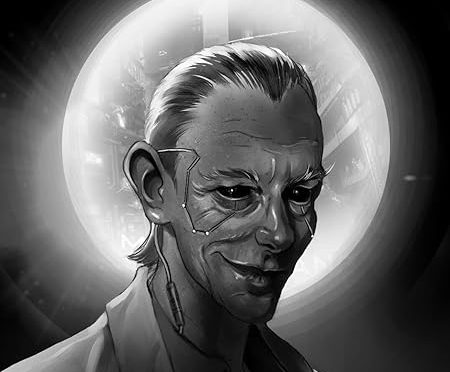
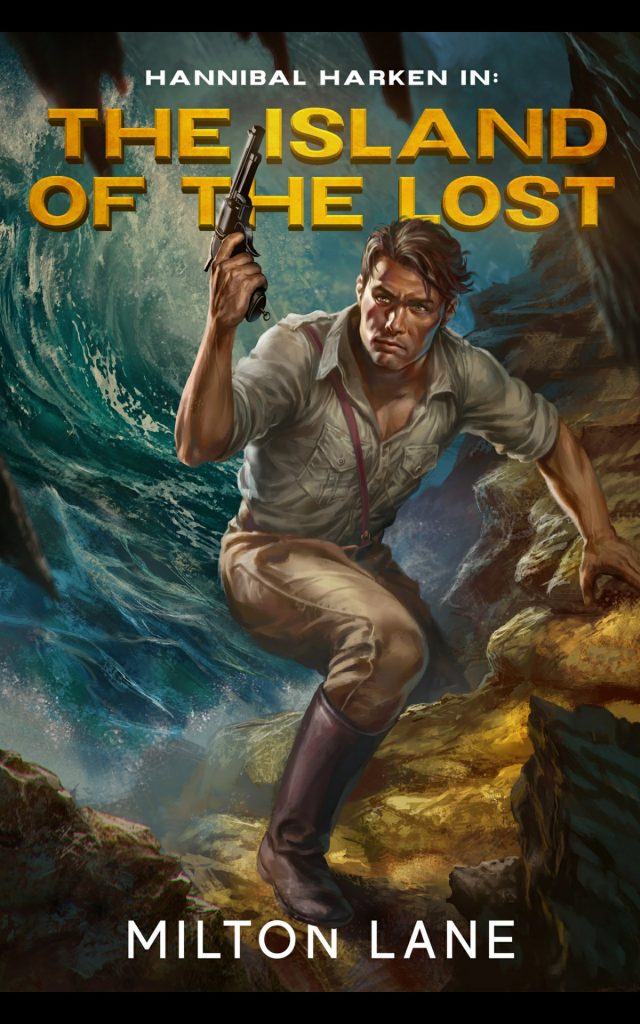
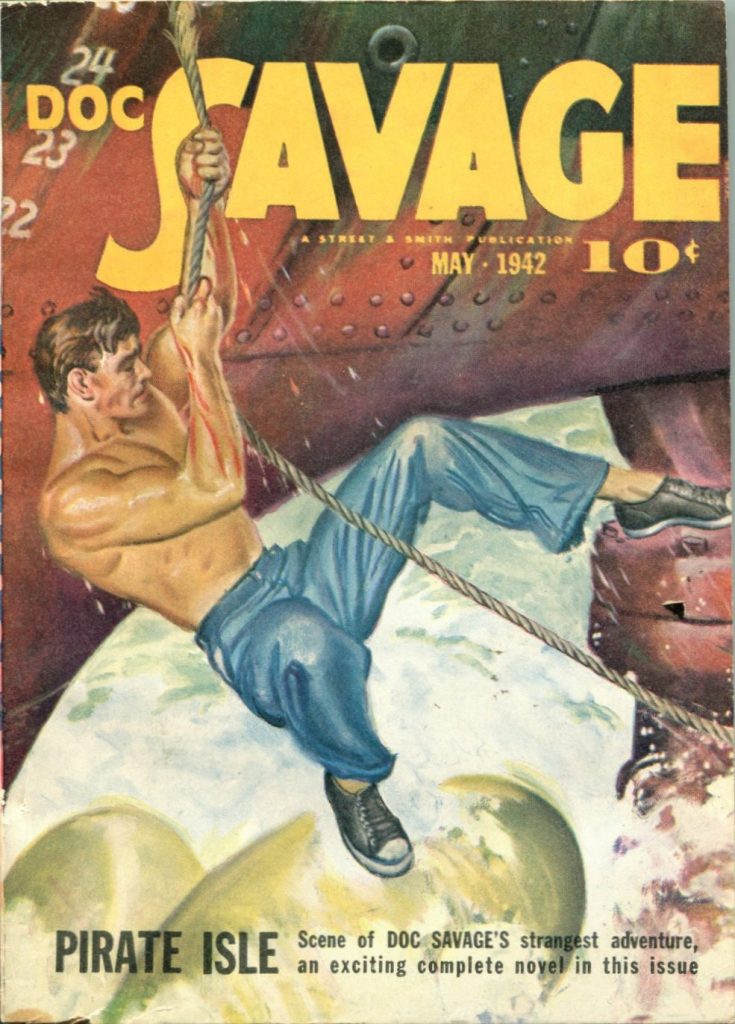
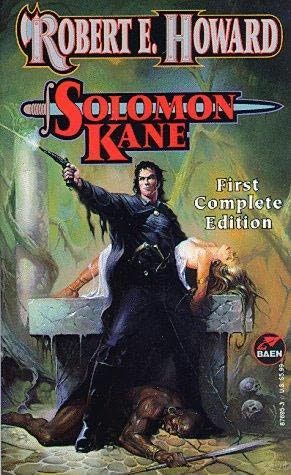
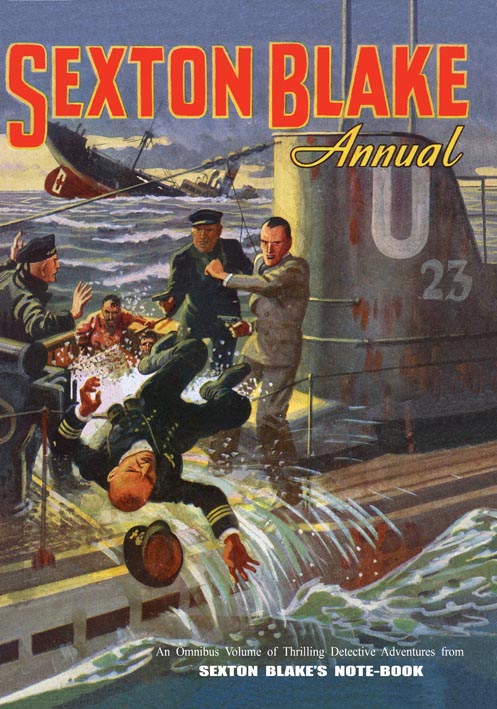
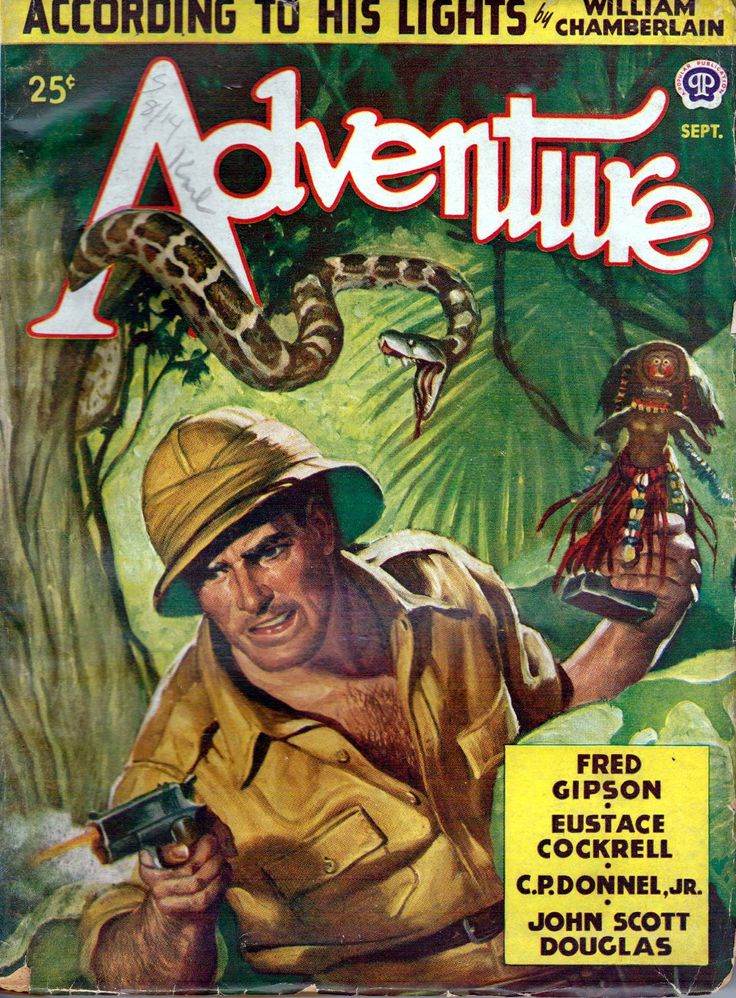
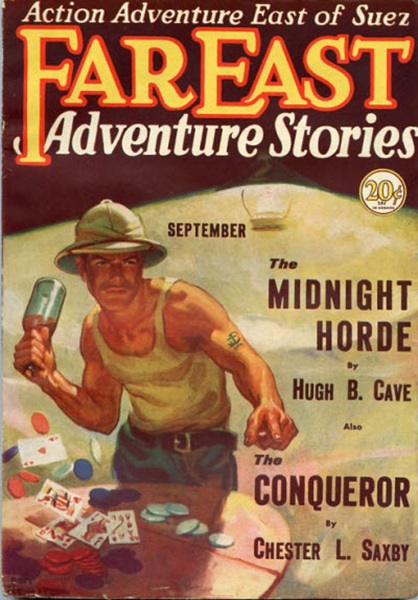
Great interview! I always love reading about the creative process. Also delighted to know there will be more stories from Salvation coming!
Thank you for reading + leaving a comment!